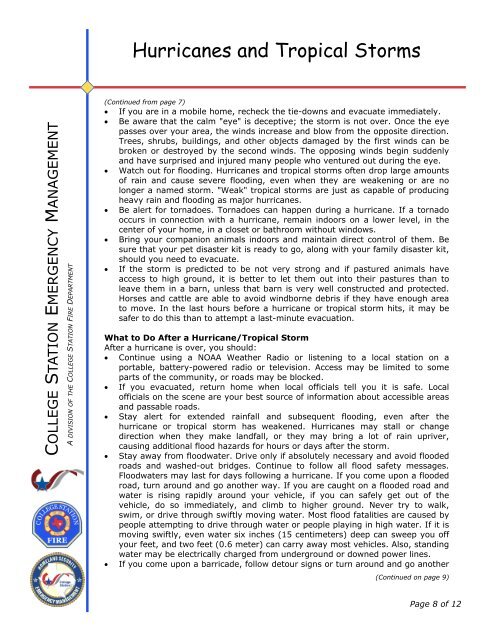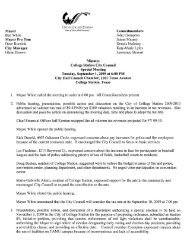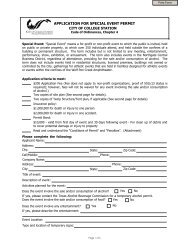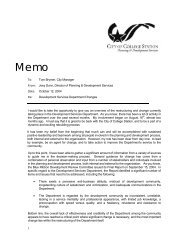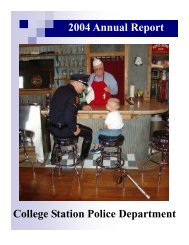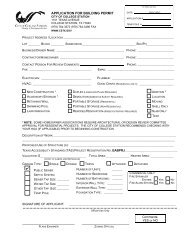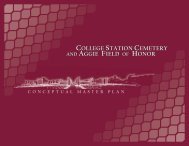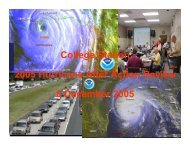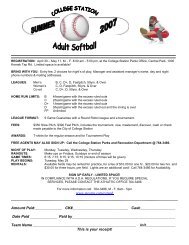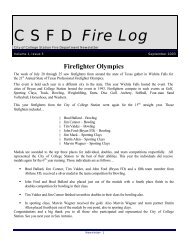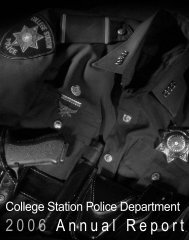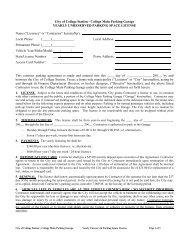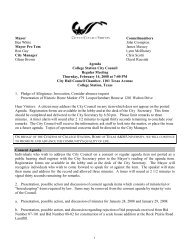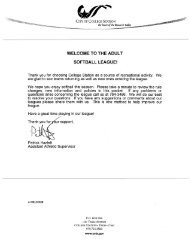Hurricanes and Tropical Storms - City of College Station
Hurricanes and Tropical Storms - City of College Station
Hurricanes and Tropical Storms - City of College Station
You also want an ePaper? Increase the reach of your titles
YUMPU automatically turns print PDFs into web optimized ePapers that Google loves.
<strong>Hurricanes</strong> <strong>and</strong> <strong>Tropical</strong> <strong>Storms</strong><br />
COLLEGE STATION EMERGENCY MANAGEMENT<br />
A DIVISION OF THE COLLEGE STATION FIRE DEPARTMENT<br />
(Continued from page 7)<br />
• If you are in a mobile home, recheck the tie-downs <strong>and</strong> evacuate immediately.<br />
• Be aware that the calm "eye" is deceptive; the storm is not over. Once the eye<br />
passes over your area, the winds increase <strong>and</strong> blow from the opposite direction.<br />
Trees, shrubs, buildings, <strong>and</strong> other objects damaged by the first winds can be<br />
broken or destroyed by the second winds. The opposing winds begin suddenly<br />
<strong>and</strong> have surprised <strong>and</strong> injured many people who ventured out during the eye.<br />
• Watch out for flooding. <strong>Hurricanes</strong> <strong>and</strong> tropical storms <strong>of</strong>ten drop large amounts<br />
<strong>of</strong> rain <strong>and</strong> cause severe flooding, even when they are weakening or are no<br />
longer a named storm. "Weak" tropical storms are just as capable <strong>of</strong> producing<br />
heavy rain <strong>and</strong> flooding as major hurricanes.<br />
• Be alert for tornadoes. Tornadoes can happen during a hurricane. If a tornado<br />
occurs in connection with a hurricane, remain indoors on a lower level, in the<br />
center <strong>of</strong> your home, in a closet or bathroom without windows.<br />
• Bring your companion animals indoors <strong>and</strong> maintain direct control <strong>of</strong> them. Be<br />
sure that your pet disaster kit is ready to go, along with your family disaster kit,<br />
should you need to evacuate.<br />
• If the storm is predicted to be not very strong <strong>and</strong> if pastured animals have<br />
access to high ground, it is better to let them out into their pastures than to<br />
leave them in a barn, unless that barn is very well constructed <strong>and</strong> protected.<br />
Horses <strong>and</strong> cattle are able to avoid windborne debris if they have enough area<br />
to move. In the last hours before a hurricane or tropical storm hits, it may be<br />
safer to do this than to attempt a last-minute evacuation.<br />
What to Do After a Hurricane/<strong>Tropical</strong> Storm<br />
After a hurricane is over, you should:<br />
• Continue using a NOAA Weather Radio or listening to a local station on a<br />
portable, battery-powered radio or television. Access may be limited to some<br />
parts <strong>of</strong> the community, or roads may be blocked.<br />
• If you evacuated, return home when local <strong>of</strong>ficials tell you it is safe. Local<br />
<strong>of</strong>ficials on the scene are your best source <strong>of</strong> information about accessible areas<br />
<strong>and</strong> passable roads.<br />
• Stay alert for extended rainfall <strong>and</strong> subsequent flooding, even after the<br />
hurricane or tropical storm has weakened. <strong>Hurricanes</strong> may stall or change<br />
direction when they make l<strong>and</strong>fall, or they may bring a lot <strong>of</strong> rain upriver,<br />
causing additional flood hazards for hours or days after the storm.<br />
• Stay away from floodwater. Drive only if absolutely necessary <strong>and</strong> avoid flooded<br />
roads <strong>and</strong> washed-out bridges. Continue to follow all flood safety messages.<br />
Floodwaters may last for days following a hurricane. If you come upon a flooded<br />
road, turn around <strong>and</strong> go another way. If you are caught on a flooded road <strong>and</strong><br />
water is rising rapidly around your vehicle, if you can safely get out <strong>of</strong> the<br />
vehicle, do so immediately, <strong>and</strong> climb to higher ground. Never try to walk,<br />
swim, or drive through swiftly moving water. Most flood fatalities are caused by<br />
people attempting to drive through water or people playing in high water. If it is<br />
moving swiftly, even water six inches (15 centimeters) deep can sweep you <strong>of</strong>f<br />
your feet, <strong>and</strong> two feet (0.6 meter) can carry away most vehicles. Also, st<strong>and</strong>ing<br />
water may be electrically charged from underground or downed power lines.<br />
• If you come upon a barricade, follow detour signs or turn around <strong>and</strong> go another<br />
(Continued on page 9)<br />
Page 8 <strong>of</strong> 12


